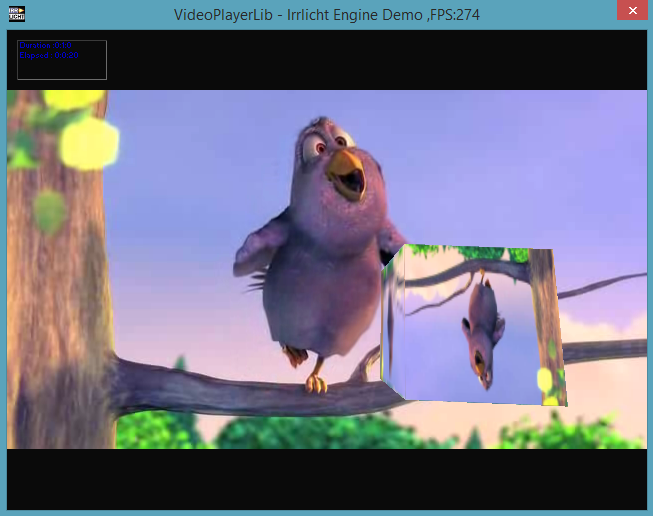So I'm not sure if I should've started a new thread for this or not, as it's semi-related and came up in the search results.
But pretty much I reached out to the ffmpeg mailing list and to their subreddit, but neither has gotten a response in a few days so thought I'd try here.
I started an Irrlicht project so that I could use ffmpeg to record the screen, and then use Irrlicht to display the screen in real-time on a texture.
That's all working, but now I'm trying to save it to a file (like maybe in .mp4 format). Figured someone here might be a bit better with dealing with pixel formats and such than me.
I got the mp4 file to open and start writing. Here's the code that writes the actual screen pixels to that file:
Code: Select all
void OutputVideoPlayer::pushFrame(AVFrame* pFrame) {
int err;
if (!videoFrame) {
videoFrame = av_frame_alloc();
videoFrame->format = AV_PIX_FMT_YUV420P;
videoFrame->width = cctx->width;
videoFrame->height = cctx->height;
if ((err = av_frame_get_buffer(videoFrame, 32)) < 0) {
std::cout << "Failed to allocate picture" << err << std::endl;
return;
}
}
if (!swsCtx) {
swsCtx = sws_getContext(cctx->width, cctx->height, AV_PIX_FMT_RGB24, cctx->width,
cctx->height, AV_PIX_FMT_YUV420P, SWS_BICUBIC, 0, 0, 0);
}
// From RGB to YUV
sws_scale(swsCtx, (uint8_t const* const*)pFrame->data, pFrame->linesize, 0, cctx->height,
videoFrame->data, videoFrame->linesize);
//videoFrame->data[0] = pFrame->data[0];
videoFrame->pts = (1.0 / 30.0) * 90000 * (frameCounter++);
std::cout << videoFrame->pts << " " << cctx->time_base.num << " " <<
cctx->time_base.den << " " << frameCounter << std::endl;
if ((err = avcodec_send_frame(cctx, videoFrame)) < 0) {
std::cout << "Failed to send frame" << err << std::endl;
return;
}
AV_TIME_BASE;
AVPacket pkt;
av_init_packet(&pkt);
pkt.data = NULL;
pkt.size = 0;
pkt.flags |= AV_PKT_FLAG_KEY;
if (avcodec_receive_packet(cctx, &pkt) == 0) {
uint8_t* size = ((uint8_t*)pkt.data);
av_interleaved_write_frame(ofctx, &pkt);
av_packet_unref(&pkt);
if (--TEST <= 0)
{
finish();
free();
}
}
}
And here's how I'm updating an Irrlicht texture using the above function:
Code: Select all
/// Copies data from the decoded Frame to the irrlicht image
void writeVideoTexture(AVFrame *pFrame, IImage* imageRt) {
if (pFrame->data[0] == NULL) {
return;
}
int width = imageRt->getDimension().Width;
int height = imageRt->getDimension().Height;
//from big Indian to little indian if needed
int i, temp;
uint8_t* frameData = pFrame->data[0];
unsigned char* data = (unsigned char*)(imageRt->lock());
//Decoded format is R8G8B8
memcpy(data, frameData, width * height * 3);
imageRt->unlock();
}
int VideoPlayer::decodeFrameInternal() {
int ret = 0;
if (ret = av_read_frame(pFormatCtx, &packet) >= 0) {
// Is this a packet from the video stream?
if (packet.stream_index == videoStream) {
// Decode video frame
avcodec_send_packet(pCodecCtx, &packet);
while (ret >= 0) {
ret = avcodec_receive_frame(pCodecCtx, pFrame);
if (ret == AVERROR(EAGAIN))
{
ret = 0;
avcodec_send_packet(pCodecCtx, &packet);
break;
}
//pFormatCtx->duration
// Convert the image from its native format to RGB
sws_scale(sws_ctx, (uint8_t const* const*)pFrame->data,
pFrame->linesize, 0, pCodecCtx->height,
pFrameRGB->data, pFrameRGB->linesize);
writeVideoTexture(pFrameRGB, imageRt);
ovp.pushFrame(pFrame); // OR writeFrame(pFrameRGB), not really sure there's a difference other than conversion in pushFrame()
}
ret = 0;
}
// Free the packet that was allocated by av_read_frame
av_packet_unref(&packet);
}
return ret;
}
The best I can get it to display looks really bad, like this:

Any ideas on why this might be?
The full, compilable code and instructions to build it are here:
https://github.com/treytencarey/IrrlichtVideoPlayerLib/
